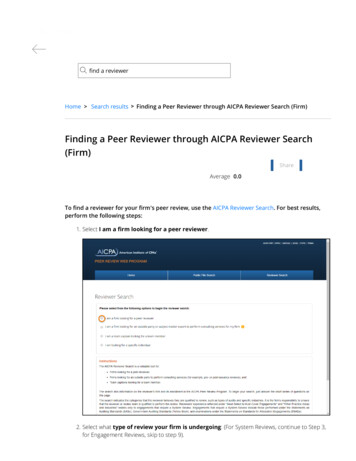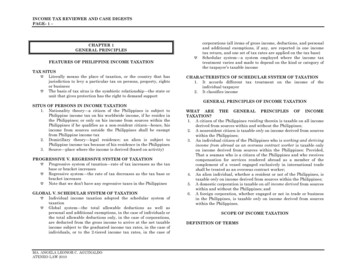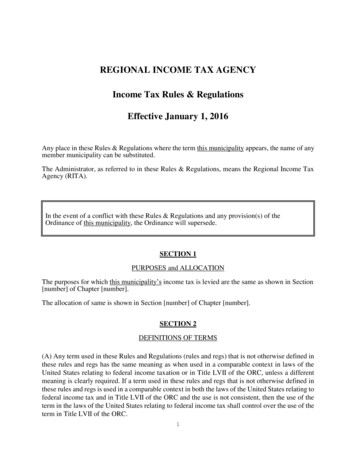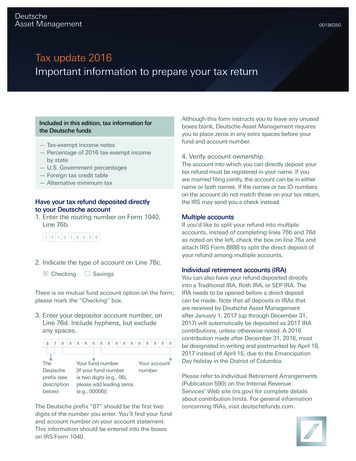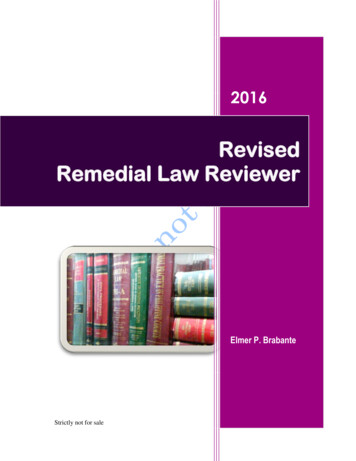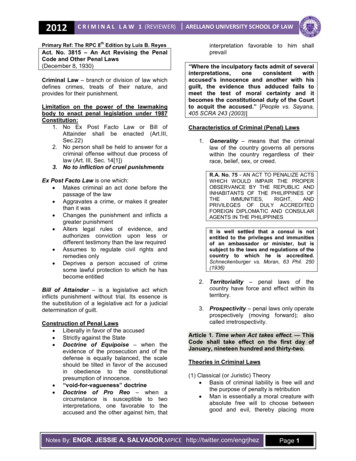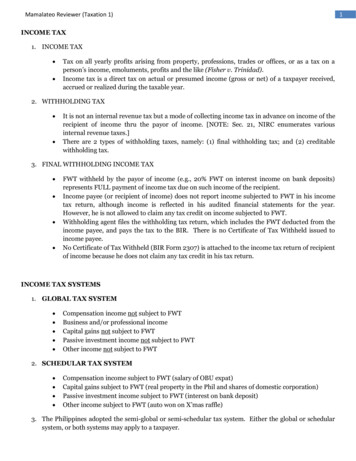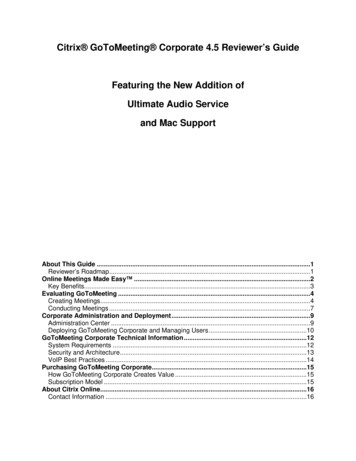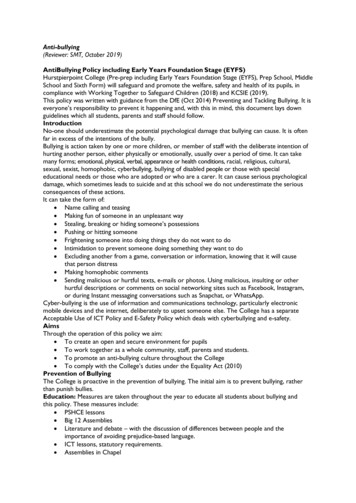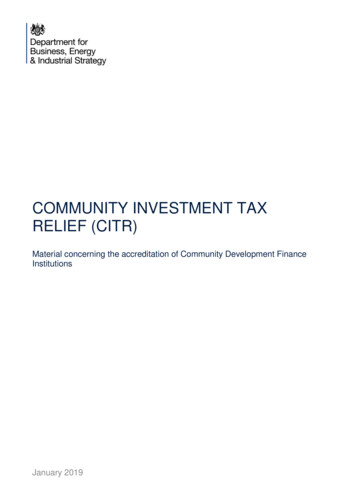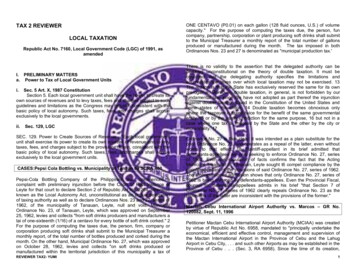
Transcription
TAX 2 REVIEWERLOCAL TAXATIONRepublic Act No. 7160, Local Government Code (LGC) of 1991, asamendedI. PRELIMINARY MATTERSa. Power to Tax of Local Government Unitsi.Sec. 5 Art. X, 1987 ConstitutionSection 5. Each local government unit shall have the power to create itsown sources of revenues and to levy taxes, fees and charges subject to suchguidelines and limitations as the Congress may provide, consistent with thebasic policy of local autonomy. Such taxes, fees, and charges shall accrueexclusively to the local governments.ii.Sec. 129, LGCSEC. 129. Power to Create Sources of Revenue. - Each local governmentunit shall exercise its power to create its own sources of revenue and to levytaxes, fees, and charges subject to the provisions herein, consistent with thebasic policy of local autonomy. Such taxes, fees, andcharges shall accrueexclusively to the local government units.CASES:Pepsi Cola Bottling vs. Municipality of Tanuan 69 SCRA 460Pepsi-Cola Bottling Company of the Philippines, Inc., commenced acomplaint with preliminary injunction before the Court of First Instance ofLeyte for that court to declare Section 2 of Republic Act No. 2264. otherwiseknown as the Local Autonomy Act, unconstitutional as an undue delegationof taxing authority as well as to declare Ordinances Nos. 23 and 27, series of1962, of the municipality of Tanauan, Leyte, null and void. MunicipalOrdinance No. 23, of Tanauan, Leyte, which was approved on September25, 1962, levies and collects "from soft drinks producers and manufacturers atai of one-sixteenth (1/16) of a centavo for every bottle of soft drink corked." 2For the purpose of computing the taxes due, the person, firm, company orcorporation producing soft drinks shall submit to the Municipal Treasurer amonthly report, of the total number of bottles produced and corked during themonth. On the other hand, Municipal Ordinance No. 27, which was approvedon October 28, 1962, levies and collects "on soft drinks produced ormanufactured within the territorial jurisdiction of this municipality a tax ofREVIEWER TAX2- YUMIONE CENTAVO (P0.01) on each gallon (128 fluid ounces, U.S.) of volumecapacity." For the purpose of computing the taxes due, the person, funcompany, partnership, corporation or plant producing soft drinks shall submitto the Municipal Treasurer a monthly report of the total number of gallonsproduced or manufactured during the month. The tax imposed in bothOrdinances Nos. 23 and 27 is denominated as "municipal production tax.'There is no validity to the assertion that the delegated authority can bedeclared unconstitutional on the theory of double taxation. It must beobserved that the delegating authority specifies the limitations andenumerates the taxes over which local taxation may not be exercised. 13The reason is that the State has exclusively reserved the same for its ownprerogative. Moreover, double taxation, in general, is not forbidden by ourfundamental law, since We have not adopted as part thereof the injunctionagainst double taxation found in the Constitution of the United States andsome states of the Union. 14 Double taxation becomes obnoxious onlywhere the taxpayer is taxed twice for the benefit of the same governmentalentity 15 or by the same jurisdiction for the same purpose, 16 but not in acase where one tax is imposed by the State and the other by the city ormunicipality. 17Ordinance No. 27 is thus clear: it was intended as a plain substitute for theprior Ordinance No. 23, and operates as a repeal of the latter, even withoutwords to that effect. 18 Plaintiff-appellant in its brief admitted thatdefendants-appellees are only seeking to enforce Ordinance No. 27, seriesof 1962. Even the stipulation of facts confirms the fact that the ActingMunicipal Treasurer of Tanauan, Leyte sought t6 compel compliance by theplaintiff-appellant of the provisions of said Ordinance No. 27, series of 1962.The aforementioned admission shows that only Ordinance No. 27, series of1962 is being enforced by defendants-appellees. Even the Provincial Fiscal,counsel for defendants-appellees admits in his brief "that Section 7 ofOrdinance No. 27, series of 1962 clearly repeals Ordinance No. 23 as theprovisions of the latter are inconsistent with the provisions of the former."Mactan Cebu International Airport Authority vs. Marcos – GR No.120082, Sept. 11, 1996Petitioner Mactan Cebu International Airport Authority (MCIAA) was createdby virtue of Republic Act No. 6958, mandated to "principally undertake theeconomical, efficient and effective control, management and supervision ofthe Mactan International Airport in the Province of Cebu and the LahugAirport in Cebu City, . . . and such other Airports as may be established in theProvince of Cebu . . . (Sec. 3, RA 6958). Since the time of its creation,1
petitioner MCIAA enjoyed the privilege of exemption from payment of realtytaxes in accordance with Section 14 of its Charter. On October 11, 1994,however, Mr. Eustaquio B. Cesa, Officer-in-Charge, Office of the Treasurerof the City of Cebu, demanded payment for realty taxes on several parcels ofland belonging to the petitioner. Petitioner objected to such demand forpayment as baseless and unjustified, claiming in its favor the aforecitedSection 14 of RA 6958 which exempt it from payment of realty taxes. It wasalso asserted that it is an instrumentality of the government performinggovernmental functions, citing section 133 of the Local Government Code of1991 which puts limitations on the taxing powers of local government units.Respondent City refused to cancel and set aside petitioner's realty taxaccount, insisting that the MCIAA is a government-controlled corporationwhose tax exemption privilege has been withdrawn by virtue of Sections 193and 234 of the Local Governmental Code that took effect on January 1,1992.As a general rule, the power to tax is an incident of sovereignty and isunlimited in its range, acknowledging in its very nature no limits, so thatsecurity against its abuse is to be found only in the responsibility of thelegislature which imposes the tax on the constituency who are to pay it.Nevertheless, effective limitations thereon may be imposed by the peoplethrough their Constitutions. 13 Our Constitution, for instance, provides thatthe rule of taxation shall be uniform and equitable and Congress shall evolvea progressive system of taxation. 14 So potent indeed is the power that itwas once opined that "the power to tax involves the power to destroy." 15Verily, taxation is a destructive power which interferes with the personal andproperty for the support of the government. Accordingly, tax statutes must beconstrued strictly against the government and liberally in favor of thetaxpayer. 16 But since taxes are what we pay for civilized society, 17 or arethe lifeblood of the nation, the law frowns against exemptions from taxationand statutes granting tax exemptions are thus construed strictissimi jurisagainst the taxpayers and liberally in favor of the taxing authority. 18 A claimof exemption from tax payment must be clearly shown and based onlanguage in the law too plain to be mistaken. 19 Elsewise stated, taxation isthe rule, exemption therefrom is the exception. 20 However, if the grantee ofthe exemption is a political subdivision or instrumentality, the rigid rule ofconstruction does not apply because the practical effect of the exemption ismerely to reduce the amount of money that has to be handled by thegovernment in the course of its operations. 21The power to tax is primarily vested in the Congress; however, in ourjurisdiction, it may be exercised by local legislative bodies, no longer merelyby virtue of a valid delegation as before, but pursuant to direct authorityconferred by Section 5, Article X of the Constitution. 22 Under the latter, theREVIEWER TAX2- YUMIexercise of the power may be subject to such guidelines and limitations asthe Congress may provide which, however, must be consistent with the basicpolicy of local autonomy.There can be no question that under Section 14 of R.A. No. 6958 thepetitioner is exempt from the payment of realty taxes imposed by theNational Government or any of its political subdivisions, agencies, andinstrumentalities. Nevertheless, since taxation is the rule and exemptiontherefrom the exception, the exemption may thus be withdrawn at thepleasure of the taxing authority. The only exception to this rule is where theexemption was granted to private parties based on material consideration ofa mutual nature, which then becomes contractual and is thus covered by thenon-impairment clause of the Constitution. 23The LGC, enacted pursuant to Section 3, Article X of the constitutionprovides for the exercise by local government units of their power to tax, thescope thereof or its limitations, and the exemption from taxation.Manila Electric Company vs. Province of Laguna – GR No. 131359, May5, 1999Meralco was granted a franchise to operate an electric light and powerservice in Calamba, Laguna sometime in 1983 under P.D. No. 551. Underthe franchise Meralco pays 2% franchise tax on of its gross receipts and “anylaw to the contrary notwithstanding be in lieu of all taxes and assessments ofwhatever nature imposed by any national or local authority or earnings,receipts, income and privilege of generation, distribution and sale of electriccurrent.” Pursuant to the Local Government Code, the province of Lagunaenacted an ordinance imposing a franchise of 50% of 1% of the gross annualreceipts of business enjoying a franchise realized during the precedingcalendar year within the province including cities located therein. Rule on thevalidity of the tax ordinance.SUGGESTED ANSWER: The tax ordinance is valid. Under the nowprevailing Constitution, where there is neither a grant nor prohibition bystatute, the tax power must be deemed to exist although Congress mayprovide statutory limitations and guidelines. The basic rationale for thecurrent rule is to safeguard the viability and self-sufficiency of localgovernment units by directly granting them general and broad tax powers.The Local Government Code explicitly authorizes provinces and cities,notwithstanding “any exemption granted by any law or other special law” toimpose a tax on businesses enjoying a franchise. Indicative of the legislativeintent to carry out the constitutional mandate of vesting broad tax powers to2
local government units, the Local Government Code has withdrawn taxexemptions or incentives theretofore enjoyed by certain entities.In addition, the Local Government Code contains a general repealing clause.The phrase in “lieu of all taxes” has to give way to the peremptory languageof the Local Government Code which specifically provides for the withdrawalof all exemptions. The Court has viewed its previous rulings as laying stresson the legislative intent of the amendatory law whether the tax exemptionprivilege is to be withdrawn or not rather than on whether the law can orcannot withdraw the tax exemption, without violating the constitution. (ManilaElectric Company v. Province of Laguna, et al., G.R. No. 131359, May 5,1999)NPC vs. City of Cabanatuan GR No. 149110, April 9, 2003“Paradigm shift” from exclusive Congressional power to direct grant of taxingpower to local legislative bodies. The power to tax is no longer vestedexclusively on Congress; local legislative bodies are now given directauthority to levy taxes, fees and other charges pursuant to Article X, section5 of the 1987 Constitution.NAPOCOR, the petitioner, is a government-owed and controlled corporationcreated under Commonwealth Act 120. It is tasked to undertake the“development of hydroelectric generations of power and the production ofelectricity from nuclear, geothermal, and other sources, as well as, thetransmission of electric power on a nationwide basis.”For many years now, NAPOCOR sells electric power to the residentCabanatuan City, posting a gross income of P107,814,187.96 in 1992.Pursuant to Sec. 37 of Ordinance No. 165-92, the respondent assessed thepetitioner a franchise tax amounting to P808,606.41, representing 75% of 1%of the former’s gross receipts for the preceding year.Petitioner, whose capital stock was subscribed and wholly paid by thePhilippine Government, refused to pay the tax assessment. It argued that therespondent has no authority to impose tax on government entities. Petitioneralso contend that as a non-profit organization, it is exempted from thepayment of all forms of taxes, charges, duties or fees in accordance withSec. 13 of RA 6395, as amended.The respondent filed a collection suit in the RTC of Cabanatuan City,demanding that petitioner pay the assessed tax, plus surcharge equivalent to25% of the amount of tax and 2% monthly interest. Respondent alleged thatpetitioner’s exemption from local taxes has been repealed by Sec. 193 of RA7160 (Local Government Code). The trial court issued an order dismissingthe case. On appeal, the Court of Appeals reversed the decision of the RTCand ordered the petitioner to pay the city government the tax assessment.REVIEWER TAX2- YUMIIssues: (1) Is the NAPOCOR excluded from the coverage of the franchise taxsimply because its stocks are wholly owned by the National Government andits charter characterized is as a ‘non-profit organization’?(2) Is the NAPOCOR’s exemption from all forms of taxes repealed by theprovisions of the Local Government Code (LGC)?Held: (1) NO. To stress, a franchise tax is imposed based not on theownership but on the exercise by the corporation of a privilege to dobusiness. The taxable entity is the corporation which exercises the franchise,and not the individual stockholders. By virtue of its charter, petitioner wascreated as a separate and distinct entity from the National Government. Itcan sue and be sued under its own name, and can exercise all the powers ofa corporation under the Corporation Code.To be sure, the ownership by the National Government of its entire capitalstock doe
TAX 2 REVIEWER LOCAL TAXATION Republic Act No. 7160, Local Government Code (LGC) of 1991, as amended I. PRELIMINARY MATTERS a. Power to Tax of Local Government Units i. Sec. 5 Art. X, 1987 Constitution Section 5. Each local government unit shall have the power to create its own sources of revenues and to levy taxes, fees and charges subject to such
